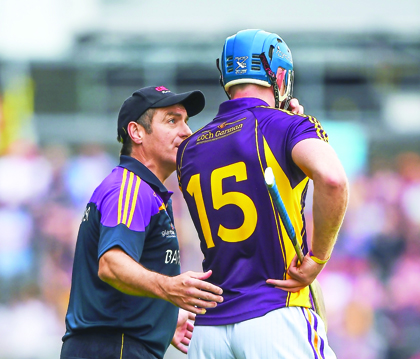
Managers must give detailed feedback to their players if they want to see improvement
At the end of last season, Pete McGrath cited an Ulster title as the Fermanagh team ‘goal’ for 2016.
Mickey Harte’s goal is even simplier – ‘win every game’ and thus win every competition entered.
Kieran McGeeney has the goal of turning round the fortunes of Armagh inside five years.
Jurgen Klopp, on being appointed manager of Premier League side Liverpool, saw his goal as winning a title inside three years.
‘Goals set’ are the first part of a trio of actions, viz ‘goals set’; goals should be measurable and be measured and feeback given regularly. If one or all of these elements is neglected the goal will not be achieved.
A study of cyclists’ performances under difficult coaching conditions, carried by Bandura and Corvone found that those who had no goal at all (so no measurement and feedback) experienced just a 21% increase in performance.
Coincidentally, those who had a goal and experienced measurement only and those who had a goal and received feedback only increased their performance by 25% each.
Those cyclists whose goals were measured and was fed back increased performance by 59%.
Goals and their measurements are largely straightforward in approach while there are five levels of feedback in common use:
(a) A Personalised criticism
After a poor performance, a player is informed by the manager’s exclamation, “You are useless.” This personalised criticism devastates
self-esteem and confidence and is likely to make future performances even worse. It contains nothing helpful.
(b) A Judgemental comment
After another performance, a player is asked for a written self-appraisal. The manager’s intervention is again, “This appraisal is useless.” This judgemental comment directed at the appraisal, not at the player, also damages the player’s self-esteem (less badly), but still provides no information on which the player author can correct it.
(c) Some information given but generates no ownership
Here the manager intervenes on the player’s appraisal with, “The content of your appraisal was clear and concise, but its layout and presentation were ‘bit-ty’, haphazard and with no structure re your game.” This avoids player criticism and provides the player with some
information on which to act, but in insufficient detail to allow the player to generate/regain ownership.
(d) Ownership but a shallow judgement
In a verbal question, he asks the player to comment on his game or on reading the player’s appraisal, the manager asks: “How do you feel
about your appraisal?” The player now has ownership, but is likely to give a non response, eg, “Fine or make a value judgement eg, “great or
lousy”, rather than a more useful description.
(e) Detailed non judgemental player description is given
Because the manager began with “What were your personal goals for the game? To what extent did you achieve them? What other points, good or bad, do you want to emphasise? In response to these type of questions, players will give a detailed,
non-judgemental description of their game and their thinking behind it.
Level ‘E’ is the best approach as it accelerates learning and improves performance. To answer the manager questions of level E, the player is
compelled to engage his brain and get involved. He has to recollect and formulate his thoughts before he can give his responses. This is
awareness, helping him to evaluate his own work and becomes more self-reliant. This way, he owns his performance and his assessment of it.
This is taking responsibility. When awareness and responsibility are optimised, learning occurs. I’ve often used a 20-question self appraisal form to be completed by each player and by me (about every player who played) after every game.
Based on our combined appraisals responses, I can then debate with players, ie, ‘coach’ me asking the questions and the player responding
about what were the good points (the working parts) and decide how we can strengthen both.
Receive quality journalism wherever you are, on any device. Keep up to date from the comfort of your own home with a digital subscription.
Any time | Any place | Anywhere











